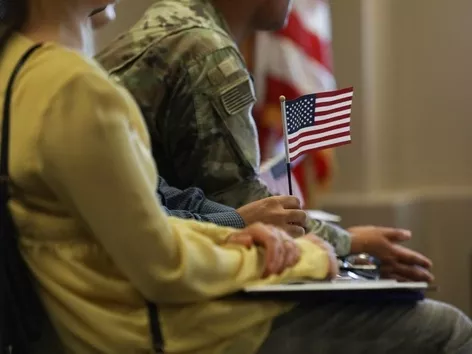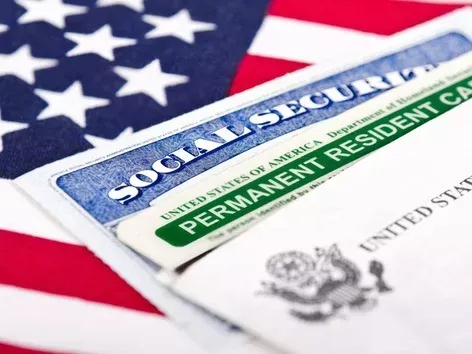The US Military Helps Naturalize Non-Citizens: how does serving in the US military make the path to citizenship easier?
Table of contents
- Advantages of obtaining citizenship through military service
- Requirements for military personnel to obtain US citizenship under a simplified procedure
-
Five steps to naturalization and US citizenship through military service
- Step 1 – Make sure you are eligible for citizenship.
- Step 2 – Fill out the N-400 form
- Step 3 – Provide your fingerprints
- Step 4 – Personal interview with a designated USCIS officer at a designated location
- Step 5 – Attend a naturalization ceremony to take the Oath of Allegiance and officially become a US citizen
- Can family members of a serviceman obtain citizenship under a simplified procedure?

Every year, thousands of military personnel and their family members who were born outside the United States but served in the American military become naturalized citizens of the country. Learn how to become a US citizen and how you can use your military service to speed up the process and save money on your application
Naturalization is the process by which an immigrant can become a US citizen. To apply for a US passport, you must have lived in the United States for 3 to 5 years or be a member of the US Armed Forces.
Today we're going to talk about how serving in the U.S. military makes the path to citizenship easier for current and former U.S. military personnel.
Advantages of obtaining citizenship through military service
There are three primary benefits for foreign-born military personnel applying for US citizenship:
1. A short period of residence before applying
Generally, applicants must reside in the United States of America as lawful permanent residents for five continuous years, or three years if married to a US citizen, before they can apply for citizenship. However, foreign-born service members only need one year of honorable service before they can file Form N-400 (Application for Naturalization).
2. There are no requirements regarding the country of residence
Civilian applicants must reside in a specific US county for at least three months before they are eligible to file Form N-400. Military personnel of foreign origin do not have to meet this requirement.
3. Exemption from the application fee.
In addition to the naturalization application fee and fingerprinting fee, civilian applicants pay about $800 to become a U.S. citizen. Military personnel who were born abroad do not have to pay an application fee, although their spouses do.
Requirements for military personnel to obtain US citizenship under a simplified procedure
In peacetime
1. Serve with honor in the US Army for at least 1 year.
An individual's service is considered "honorable" if a specific branch of the US military has specifically designated it as such.
2. Age – 18 years or older
3. Be a lawful permanent resident at the time of the naturalization interview.
4. Must demonstrate good moral character for at least 5 years prior to submitting the application — until naturalization.
5. Must have served in the US Armed Forces for a total of one year, although the year need not be continuous.
6. Must understand, speak, read and write English
7. Must show that they know the history and government of the United States.
8. Must be devoted to the general welfare of the country
9. Must support the ideas set forth in the Constitution
During hostilities
If the applicant served honorably in the US Armed Forces during a "period of hostilities" including the period from September 11, 2001 to the present, he can apply for US citizenship.
For this, the applicant must meet a number of the following requirements:
- Can be of any age.
- Must understand, speak, read and write in English
- Must be a permanent resident or, alternatively, physically present in the United States (including the Channel Zone, Swains Island, American Samoa, or on a government vessel owned by the United States) at the time of enlistment, re-enlistment, enlistment, or continued service in the United States Armed Forces .
- To serve during the period of hostilities (see below).
- Be of good moral character during the year prior to the date of application.
- Demonstrate knowledge of US history and government.
- Support the US Constitution
- To be devoted to the welfare of the United States of America.
Defined periods of enmity:
- World War I: April 6, 1917 – November 11, 1918.
- World War II: September 1, 1939 - December 31, 1946.
- Conflict in Korea: June 25, 1950 - July 1, 1955.
- Military operations in Vietnam: February 28, 1961 - October 15, 1978.
- The conflict in the Persian Gulf: August 2, 1990 - April 11, 1991.
- The War on Terror: September 11, 2001 to the Present.
To move, travel or work safely in a new country, you will need health insurance. You can apply for an extended policy on our website here.
Five steps to naturalization and US citizenship through military service
Step 1 – Make sure you are eligible for citizenship.
To do this, answer a few simple questions in the online form. After you complete your portion of the form, complete the command information and sign Form N-426, Request for Military or Naval Service Diploma. Your command, which must be O-6 or above, may certify this uniform after you have honorably served at least one day of active duty during periods of hostilities -- which have continued continuously since September 11, 2001 -- or one full year in peacetime . This period also includes basic training.
Step 2 – Fill out the N-400 form
This step includes filling out Form N-426 and obtaining the certificate from the previous step. The instructions for Form N-400 explain how to complete the form and tell you what documents USCIS must provide to complete the naturalization process. Gather these documents before completing and submitting your application.
You can submit a paper application by sending it to the box listed in the instructions, or you can submit online after creating a myUSCIS account. USCIS will conduct a security screening as part of the application process.
Step 3 – Provide your fingerprints
If you live in the US, you will be notified to contact the Application Support Center to provide your fingerprints as part of the required security checks. Military and veterans do not need to make an appointment to be fingerprinted at the Application Support Center, but you will need to bring a current military ID.
USCIS will use fingerprints from a previous immigration application if available. If you are overseas, you may submit two FD-258 fingerprint cards and two passport photographs taken by military police or officials of the Department of Homeland Security, U.S. Embassy, or Consulate when you file Form N-400. Your fingerprints, if available, may be used if you are unable to appear for fingerprinting.
Step 4 – Personal interview with a designated USCIS officer at a designated location
A USCIS officer will review your application with you and test your knowledge of spoken and written English, citizenship regulations, and US history. Depending on how your interview goes, the officer will recommend that your naturalization application be approved, denied, suspended, or continued for further consideration. If your Form N-400 application is denied, you will receive a written notice explaining the reasons for the denial and how to appeal the decision. If you work for OCONUS, you may be interviewed and naturalized abroad at certain institutions.
Step 5 – Attend a naturalization ceremony to take the Oath of Allegiance and officially become a US citizen
If USCIS approves your Form N-400, it may happen on the same day as your interview, or it may be scheduled for a future date.
Importantly! Many military facilities have a designated USCIS representative at a local USCIS office to assist you in the application process. Be sure to check with your commanding officer and the legal aid office at your local facility for the most up-to-date information on naturalization policies for active-duty military personnel.
Can family members of a serviceman obtain citizenship under a simplified procedure?
Dependents of military personnel and veterans can also apply for US citizenship.
Including those family members who live abroad. Eligible military spouses may naturalize abroad without going to the United States, but only if the applicant:
- Has the right to accompany a serviceman abroad in accordance with his official orders.
- Is married to a military serviceman and lives with him abroad.
- Meets the requirements of section 316(a) or 319(a) of the Immigration and Nationality Act at the time of application for naturalization, except for the residency and physical presence requirements.
Children of service members living abroad and under official orders, including those adopted by American parents, can become naturalized US citizens by filing Form N-600K.
We will remind you! In June 2024, the US government announced a new legal protection policy for spouses of undocumented US citizens. As expected, the application process started on August 19, 2024. We have already told who can participate in the program and what documents must be submitted for legalization in the USA.
Igor Usyk - Head of Migration department at VisitWorld
To ensure a safe trip abroad, I advise you to contact a specialist. My colleagues, qualified specialists with legal education, will help you avoid unpleasant situations while traveling around the world.
Products from Visit World for a comfortable trip:
Checklist for obtaining a visa and necessary documents in the USA;
Legal advice on immigration to the USA;
Travel insurance for foreigners in the USA;
Medical insurance all over the world.
We monitor the accuracy and relevance of our information, so if you notice any errors or inconsistencies, please contact our hotline.
Frequantly
asked questions
Does serving in the US military confer citizenship?
Does the US military accept non-US citizens?
Can a non-US citizen enter a military base?
Recommended articles
3 min
Residence permit
How to get a residence permit in Switzerland: types of permits available and pathways to citizenship
Switzerland is a popular country among expats, because it guarantees its residents safety, highly developed healthcare and education systems and is a real haven of peace near the main European capitals. Find out what types of residence permits are available to foreigners and what are the paths to citizenship
03 Oct. 2024
More details2 min
Residence permit
Applications for the Diversity Visa Lottery 2027 will begin on October 1, 2025, a program in which the US government selects 55,000 winners each year and issues them with immigrant visas (Green Cards). Learn more about the requirements for participants in the US Green Card Lottery, how and when to apply, the procedure for selecting winners of the Diversity Immigrant Visa Program, and other important nuances that expats should know
26 Sep. 2025
More details1 min
Expats
Methods of obtaining citizenship: What is the Difference Between Jus Soli and Jus Sanguinis?
Although the procedure for obtaining citizenship varies from country to country, most countries adhere to the two basic principles of Jus Soli and Jus Sanguinis. Find out what is the difference between them and what are the features of each of the procedures
15 Sep. 2024
More details3 min
Residence permit
EB2 NIW: Frequently Asked Questions
The EB2 NIW visa allows foreign professionals whose work is in the national interest of the United States to obtain work authorization under a simplified procedure. We have collected answers to the most common questions related to this permission in this article
20 Sep. 2024
More detailsAll materials and articles are owned by VisitWorld.Today and are protected by international intellectual property regulations. When using materials, approval from VisitWorld.Today is required.
